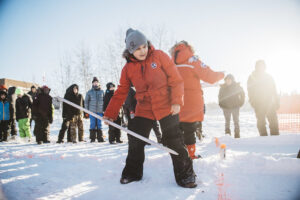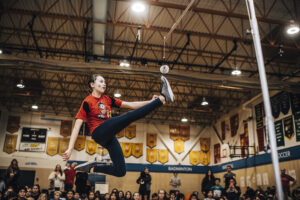Did you know that there is an international, biennial sport competition that brings together northern and Arctic athletes for a week of friendly competition, cultural exchange and social interaction? Welcome to the Arctic Winter Games, an exciting athletic competition that strengthens sport development in the communities where athletes live, enhances cultural awareness and understanding, increases community pride, boosts athletes’ self-esteem and promotes volunteerism.
History of the Arctic Winter Games
Concerned by the lack of competition that northern athletes and coaches had access to, commissioners from the Yukon, Northwest Territories and Alaska started the Arctic Winter Games in 1969. The first Games were held in Yellowknife, Northwest Territories in 1970, and the most recent Arctic Winter Games took place from January 29 to February 4, 2023, in Wood Buffalo, Alberta.
The 2023 Arctic Winter Games
The 2023 Games included athletes from the Yukon, Northwest Territories, Nunavut, Nunavik (northern Quebec), northern Alberta, Alaska, Greenland, and the Indigenous people (Sami) of Norway, Sweden, and Finland. The most recent Games featured 20 sporting events, including snowshoeing, cross-country skiing, Arctic sports and Dene games. Some sports at the Arctic Winter Games are one of the few ways that traditional Indigenous cultures keep being practiced today.
Dene games
Rooted in traditional and cultural values, Dene games are competitive sports that test physical and mental skill. Before colonization, the economy of the Northern Athapaskan peoples, or Dene (the aboriginal inhabitants of the northern regions of Canada and Alaska), mainly centered around hunting, fishing and food gathering. Dene games prepared them for these activities, testing their endurance, speed, strength, pain tolerance and mental agility. The Dene also played these games for entertainment and during social gatherings.
Dene games continue being played today in several community centres and schools in the north to demonstrate athletic skill, to preserve culture and tradition, and for education and entertainment. Dene games are also part of many national and international athletic competitions, including the Arctic Winter Games, which feature five Dene games: snow snake, finger pull, stick pull, hand games and pole push. One goal of the Dene games is to keep up the traditions of sharing, so coaches, athletes and officials actually offer technical tips and encouragement to their opponents during competition to help them achieve the best results possible.
Arctic sports
Games have always been important to the Inuit way of life. During community festivals, the Inuit people played games that were not only supposed to be fun and competitive but also educational, preparing them for living on the land and hunting. Many of these games tested their agility, strength, endurance and pain tolerance – essential for Arctic survival.
Still played today, Arctic sports (also called Inuit games or Northern games) include one-foot high kick, two-foot high kick, Alaskan high kick, kneel jump, sledge jump, triple jump, arm pull, airplane, one-hand reach, head pull and knuckle hop.










